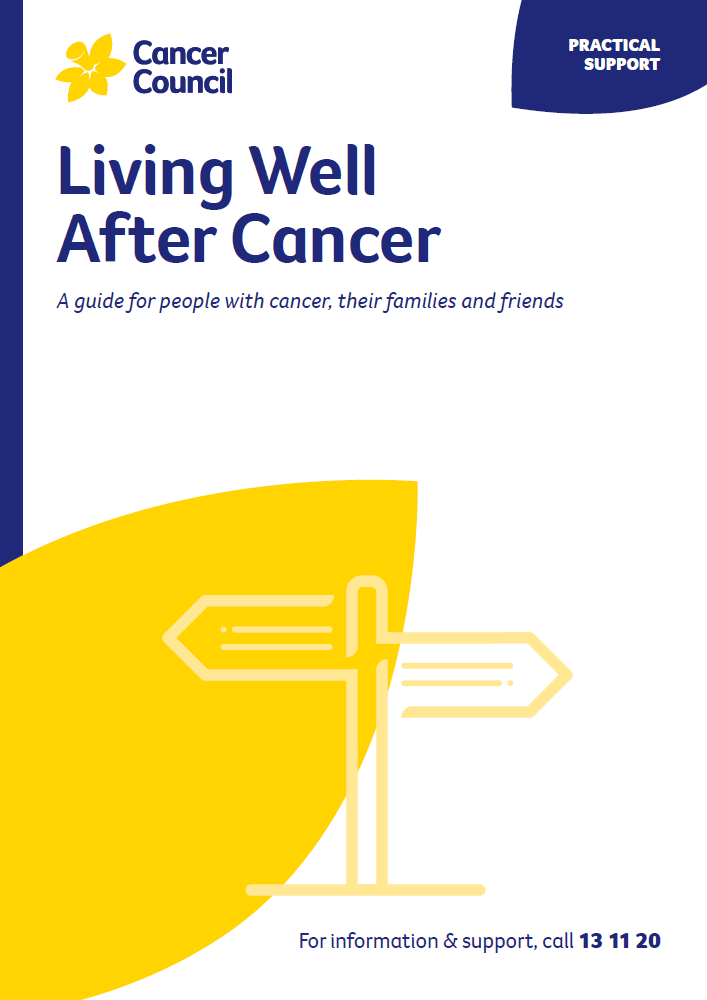- Home
- Non-Hodgkin lymphoma
- Life after treatment
Life after treatment
For most people, the cancer experience doesn’t end on the last day of treatment. Life after cancer treatment can present its own challenges. You may have mixed feelings when treatment ends, and worry that every ache and pain means the cancer is coming back.
Some people say that they feel pressure to return to “normal life”. It is important to allow yourself time to adjust to the physical and emotional changes, and establish a new daily routine at your own pace. Your family and friends may also need time to adjust.
Cancer Council 13 11 20 can help you connect with other people who have had non-Hodgkin lymphoma, and provide you with information about the emotional and practical aspects of living well after cancer.
For more on this, see Living well after cancer.
Learn more about:
- Follow-up appointments
- Dealing with feelings of sadness
- Looking after yourself
- What if non-Hodgkin lymphoma returns?
Follow-up appointments
After treatment, you will have regular appointments to monitor your health, manage any long-term side effects and check that the lymphoma hasn’t come back or spread.
Your follow-up schedule will depend on the type of non-Hodgkin lymphoma you were diagnosed with and the treatment you had. Your doctor may want to see you 3–4 times a year for the first couple of years. Check-ups will become less frequent if you have no further problems. Your doctor will talk to you about your follow-up schedule.
During these check-ups, you will have a physical examination, blood tests and, possibly, scans. Your doctor will also discuss any new symptoms or late effects of treatment. Between follow-up appointments, let your doctor know immediately of any health problems or new symptoms.
Dealing with feelings of sadness
If you have continued feelings of sadness, have trouble getting up in the morning or have lost motivation to do things that previously gave you pleasure, you may be experiencing depression. This is quite common among people who have had cancer.
Talk to your GP, because counselling or medication – even for a short time – may help. Some people can get a Medicare rebate for sessions with a psychologist. Cancer Council may also run a counselling program in your area.
For information about coping with depression and anxiety, call beyondblue on 1300 22 46 36. For 24-hour crisis support, call Lifeline on 13 11 14.
Looking after yourself
Cancer can cause physical and emotional strain, so it’s important to look after your wellbeing. Cancer Council has free booklets and programs to help you during and after treatment. Call 13 11 20 to find out more, or see Managing cancer side effects, Exercise during cancer treatment, Complementary therapies, Emotions and cancer, Nutrition and cancer, Sexuality, Intimacy and Cancer, Fertility and Cancer and Living well after cancer.
Alternative therapies are therapies used instead of conventional medical treatments. These are unlikely to be scientifically tested and may prevent successful treatment of the cancer. Cancer Council does not recommend the use of alternative therapies as a cancer treatment.
What if non-Hodgkin lymphoma returns?
For some people, non-Hodgkin lymphoma comes back after a period of remission. This is known as a relapse. Sometimes non-Hodgkin lymphoma doesn’t respond to treatment and this is known as refractory disease. Most people with relapsed or refractory non-Hodgkin lymphoma have more treatment.
Treatment for a relapse may include chemotherapy, targeted therapy, immunotherapy and, sometimes, radiation therapy. If the cancer is more advanced or aggressive, your doctor may recommend a stem cell transplant combined with high-dose chemotherapy or CAR T-cell therapy. People with refractory disease may be offered a different treatment to the one they first had.
Podcast for people affected by cancer
Listen now
More resources
Dr Puja Bhattacharyya, Haematology Staff Specialist, Western Sydney Local Health District, Blacktown Hospital; A/Prof Christina Brown, Haematologist, Royal Prince Alfred Hospital and The University of Sydney; Dr Susan Carroll, Senior Staff Specialist, Radiation Oncology, Royal North Shore Hospital and The University of Sydney; Jo Cryer, Clinical Nurse Consultant, Haematology, St George Hospital; Marie Marr, Consumer; Katelin Mayer, Clinical Nurse Consultant, Cancer Outreach Team, Nelune Comprehensive Cancer Centre, Sydney; Vanessa Saunders, 13 11 20 Consultant, Cancer Council NSW; Elise Toyer, Haematology Clinical Nurse Consultant, Blacktown Hospital.
View the Cancer Council NSW editorial policy.
View all publications or call 13 11 20 for free printed copies.

